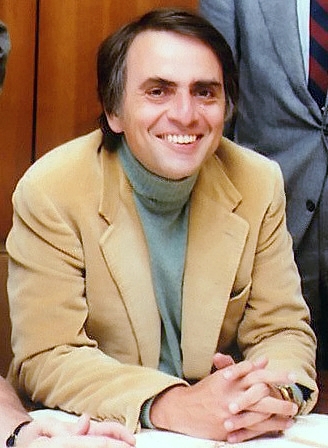Carl Sagan Berühmte Zitate
„Im Bewusstsein des Menschen erkennt die Natur sich selbst“
Quelle: http://www.carlsagan.com Übersetzer: Guido Biermann)
Original engl.: "We are a way for the Cosmos to know itself."
Carl Sagan Zitate und Sprüche
Der Drache in meiner Garage oder Die Kunst der Wissenschaft, Unsinn zu entlarven. Köln, 2000. ISBN 3-426-26912-0. Übersetzer: Michael Schmidt
"There are naive questions, tedious questions, ill-phrased questions, questions put after inadequate self-criticism. But every question is a cry to understand the world. There is no such thing as a dumb question" - The Demon-Haunted World - Science as a Candle in the Dark. Ballantine Books 1996. p. 323
Unser Kosmos (Fernsehserie), Folge 12: "Eine galaktische Enzyklopädie"
Original engl.: "What counts is not what sounds plausible, not what we would like to believe, not what one or two witnesses claim, but only what is supported by hard evidence rigorously and skeptically examined. Extraordinary claims require extraordinary evidence."
Unser Kosmos, München 1991, ISBN 3-426-04053-0, Kapitel 9, Seite 230. Übersetzer: Siglinde Summerer, Gerda Kurz
Original engl.: "If you wish to make an apple pie from scratch, you must first invent the universe."
Carl Sagan: Zitate auf Englisch
33 min 20 sec
Quelle: Cosmos: A Personal Voyage (1990 Update), Heaven and Hell [Episode 4]
Kontext: There are many hypotheses in science that are wrong. That's perfectly alright; it's the aperture to finding out what's right. Science is a self-correcting process. To be accepted, new ideas must survive the most rigorous standards of evidence and scrutiny.
Kontext: There are many hypotheses in science that are wrong. That's perfectly alright; it's the aperture to finding out what's right. Science is a self-correcting process. To be accepted, new ideas must survive the most rigorous standards of evidence and scrutiny. The worst aspect of the Velikovsky affair is not that many of his ideas were wrong or silly or in gross contradiction to the facts; rather, the worst aspect is that some scientists attempted to suppress Velikovsky's ideas. The suppression of uncomfortable ideas may be common in religion or in politics, but it is not the path to knowledge and there is no place for it in the endeavor of science. We do not know beforehand where fundamental insights will arise from about our mysterious and lovely solar system, and the history of our study of the solar system shows clearly that accepted and conventional ideas are often wrong and that fundamental insights can arise from the most unexpected sources.
Quelle: The Varieties of Scientific Experience: A Personal View of the Search for God (2006)
“Science is only a Latin word for knowledge”
Quelle: The Varieties of Scientific Experience: A Personal View of the Search for God
Quelle: Dragons of Eden: Speculations on the Evolution of Human Intelligence
Quelle: The Varieties of Scientific Experience: A Personal View of the Search for God
“Their position seems to be that their God is so great he doesn't even have to exist.”
Quelle: Contact
In Wonder and Skepticism, Skeptical Enquirer (Jan-Feb 1995), 19, No. 1.
The Varieties of Scientific Experience: A Personal View of the Search for God (2006)
The Varieties of Scientific Experience: A Personal View of the Search for God (2006)
“If we crave some cosmic purpose, then let us find ourselves a worthy goal.”
Pale Blue Dot: A Vision of the Human Future in Space (1994)
The Varieties of Scientific Experience: A Personal View of the Search for God (2006)
The Varieties of Scientific Experience: A Personal View of the Search for God (2006)
The Varieties of Scientific Experience: A Personal View of the Search for God (2006)
The Varieties of Scientific Experience: A Personal View of the Search for God (2006)
Quelle: The Demon-Haunted World : Science as a Candle in the Dark (1995), Ch. 2 : Science and Hope, p. 30
Quelle: The Demon-Haunted World : Science as a Candle in the Dark (1995), Ch. 2 : Science and Hope, p. 25
"Why We Need To Understand Science" in The Skeptical Inquirer Vol. 14, Issue 3 (Spring 1990)
Kontext: I know that science and technology are not just cornucopias pouring good deeds out into the world. Scientists not only conceived nuclear weapons; they also took political leaders by the lapels, arguing that their nation — whichever it happened to be — had to have one first. … There’s a reason people are nervous about science and technology.
And so the image of the mad scientist haunts our world—from Dr. Faust to Dr. Frankenstein to Dr. Strangelove to the white-coated loonies of Saturday morning children’s television. (All this doesn’t inspire budding scientists.) But there’s no way back. We can’t just conclude that science puts too much power into the hands of morally feeble technologists or corrupt, power-crazed politicians and decide to get rid of it. Advances in medicine and agriculture have saved more lives than have been lost in all the wars in history. Advances in transportation, communication, and entertainment have transformed the world. The sword of science is double-edged. Rather, its awesome power forces on all of us, including politicians, a new responsibility — more attention to the long-term consequences of technology, a global and transgenerational perspective, an incentive to avoid easy appeals to nationalism and chauvinism. Mistakes are becoming too expensive.
25 Min 10 Sec
Cosmos: A Personal Voyage (1990 Update), Who Speaks for Earth? [Episode 13]
Quelle: Pale Blue Dot: A Vision of the Human Future in Space (1994), p. 395
Smithsonian magazine, May 1978, pp. 43, 44. Quoted in Awake! magazine, 1978, 8/22.
